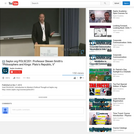
Lecture on Book V of Plato's Republic.
- Subject:
- Arts and Humanities
- Philosophy
- Material Type:
- Lecture
- Provider:
- The Saylor Foundation
- Author:
- Steven Smith
- Date Added:
- 11/07/2013

Lecture on Book V of Plato's Republic.
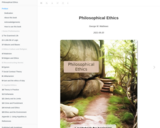
This book is an introduction to philosophical ethics intended for use in introductory college or high school level courses. It has grown out of lecture notes I shared with the first students who took my online Ethics course at the Pennsylvania College of Technology almost 20 years ago. Since then it has seen more development in a variety of forms – starting out as a pdf document, and then evolving into a static set of WordPress pages and finally now as a book written in bookdown and hosted at GitHub. This text represents my attempt to scratch a couple of itches. The first is my wanting a presentation of the major philosophical approaches to ethics that I can actually agree with and that is integrated into my overall teaching method. I tend to teach philosophy to beginners and so there is a fair amount of discussion of the tools used by philosophers and of the ways in which their approach differs from that of their colleagues in other disciplines.

This course provides an introduction to important philosophical questions about the mind, specifically those that are intimately connected with contemporary psychology and neuroscience. Are our concepts innate or are they acquired by experience? And what does it even mean to call a concept 'innate'? Are 'mental images' pictures in the head? Is color in the mind or in the world? Is the mind nothing more than the brain? Can there be a science of consciousness? The course includes guest lectures by philosophers and cognitive scientists.
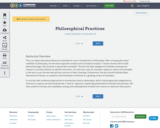
This is an Open Educational Resource intended for use in Introduction to Philosophy. After surveying the major subfields of philosophy, we introduce argument analysis and conceptual analysis. A future revision will include phenomenology. Each practice is paired with examples. The text has been designed to facilitate remixing and revision to suit the interests of specific instructors. An instructor may, for example, replace or add to the examples in the text or pair the text with primary sources of their choosing. Furthermore, the text should facilitate Open Educational Practices, as students may themselves contribute to a growing corpus of examples.In contrast with traditional approaches to introductory texts in philosophy, which may be generally categorized as historical or topical, we have emphasized a "how to" approach, explaining philosophical methods and practices. We have aimed for brevity and readability, leaving some development of detail and nuance to classroom discussions.
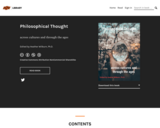
Philosophical Thought: across cultures and through the ages, is an open-educational resource (OER) to be used as a collection of readings for introductory philosophy courses. The objectives for developing and sharing this open resource are three-fold:
1. to provide a collection of philosophical works that can be used as a foundation for faculty and students to use in undergraduate philosophy courses
2. to provide a resource that is free to students
3. to provide a resource that compiles philosophical thought from a variety of cultures and eras
The works included in this book come from a wide range of sources. However, this book is indebted to Henry Imler’s editorial work on Sapienta and Phronesis, both of which are OER texts available on Pressbooks.

Word Count: 362042
(Note: This resource's metadata has been created automatically by reformatting and/or combining the information that the author initially provided as part of a bulk import process.)
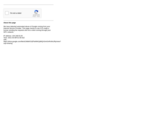
Philosophy Ethics Syllabus
PHL 202: Ethics
COURSE DESCRIPTION:
Explores basic problems in moral and social philosophy along with issues related to
human nature, for example: how to define a good life or a good society; what is the
nature of happiness, pleasure, virtue and justice; consequence vs. duty-based
theories; the role of reason and/or passion; and arguments for and against natural
law.
LEARNING OUTCOMES. Students will learn to:
1. Demonstrate understanding of major ethical theories and problems in the
Western Tradition through written and oral discussion.
2. Assess arguments and philosophical perspectives using critical reasoning.
3. Express complex thoughts logically and coherently.
4. Apply knowledge of ethical perspectives, theories, and critical reasoning to
develop his or her own opinions regarding philosophical problems and issues.

This course examines works of film in relation to thematic issues of philosophical importance that also occur in other arts, particularly literature and opera. Emphasis is put on film's ability to represent and express feeling as well as cognition. Both written and cinematic works by Sturges, Shaw, Cocteau, Hitchcock, Joyce, and Bergman, among others, are considered. There are no tests or quizzes, however students write two major papers on media/philosophical research topics of their choosing.
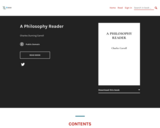
Word Count: 51188
(Note: This resource's metadata has been created automatically by reformatting and/or combining the information that the author initially provided as part of a bulk import process.)
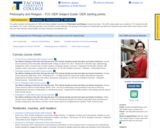
This guide compiles starting points for OER and freely available resources for Philosophy and Religion courses and topics. This OER subject guide was created for TCC faculty and staff and reflects TCC credit, continuing education, and corrections course offerings. The purpose of this guide is to help faculty and staff more easily find and review OER in their areas so that they can make decisions about quality, accuracy, relevancy, and potential use.
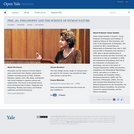
Philosophy and the Science of Human Nature pairs central texts from Western philosophical tradition (including works by Plato, Aristotle, Epictetus, Hobbes, Kant, Mill, Rawls, and Nozick) with recent findings in cognitive science and related fields. The course is structured around three intertwined sets of topics: Happiness and Flourishing; Morality and Justice; and Political Legitimacy and Social Structures.
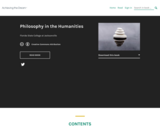
Word Count: 54231
(Note: This resource's metadata has been created automatically by reformatting and/or combining the information that the author initially provided as part of a bulk import process.)

Word Count: 49803
(Note: This resource's metadata has been created automatically by reformatting and/or combining the information that the author initially provided as part of a bulk import process.)

This course is a seminar on the philosophical analysis of film art, with an emphasis on the ways in which it creates meaning through techniques that define a formal structure. There is a particular focus on aesthetic problems about appearance and reality, literary and visual effects, communication and alienation through film technology.

This course examines fundamental issues in the philosophy of law, including the nature and content of law, its relation to morality, theories of legal interpretation, and the obligation to obey the law, as well as philosophical issues and problems associated with punishment and responsibility, liberty, and legal ethics.

This course explores the nature of love through works of philosophy, literature, film, poetry, and individual experience. It investigates the distinction among eros, philia, and agape. Students discuss ideas of love as a feeling, an action, a species of 'knowing someone,' or a way to give or take. Authors studied include Plato, Kant, Buber, D. H. Lawrence, Rumi, and Aristotle.
This course is part of the Concourse program at MIT.

This course is a seminar on the nature of love and sex, approached as topics both in philosophy and in literature. Readings from recent philosophy as well as classic myths of love that occur in works of literature and lend themselves to philosophical analysis.

Quantum mechanics--even in the ordinary, non-relativistic, "particle" formulation that will be the primary focus of this course--has been a staggeringly successful physical theory, surely one of the crowning achievements of 20th century science. It's also rather bizarre--bizarre enough to lead very intelligent and otherwise sensible people to make such claims as that the universe is perpetually splitting into many copies of itself, that conscious minds have the power to make physical systems "jump" in unpredictable ways, that classical logic stands in need of fundamental revision, and much, much more. In this course, we intelligent and sensible people will attempt to take a sober look at these and other alleged implications of quantum mechanics, as well as certain stubborn problems that continue to trouble its foundations.
Along the way, we will take plenty of time out to discuss philosophical questions about science that quantum mechanics raises in new and interesting ways: e.g., what it means to attribute probabilities to physical events, what the aims of scientific inquiry are (does it aim at something true, or merely at something useful?), what the role of observation is in constructing a scientific theory, what it means to say that there is an "objective" physical world, whether something as basic as logic can be viewed as an empirical discipline, whether there can be meaningful scientific questions whose answers cannot possibly be settled by experiment, and more.

Contained within these slides are a brief background of two philosophers of religion. Direct text evidence, explanantion, and comparison are provided.
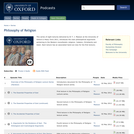
This series of eight audio lectures delivered by Dr T. J. Mawson at the University of Oxford in Hilary Term 2011, introduces the main philosophical arguments pertaining to the Western monotheistic religions: Judaism, Christianity and Islam. Each lecture has an associated hand-out (two for the first lecture).
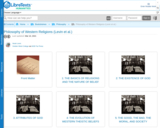
I have organized this textbook around the way I teach my introductory course in the philosophy of religion. Since I got to design this textbook and it’s for use in my own courses, it directly follows the order in which I teach the topics and each chapter makes up the reading assignment for about 1.5 hours of class time. In other words, I meet with students for thirty 1.5-hour sessions in a semester (hence there are 30 chapters in this work), and for the first meeting, we read and discuss chapter 1, for our second we cover chapter 2, then chapter 3, and so on. It leaves the guess work out of what we cover and when we cover it and keeps things very organized and streamlined. I tell you this now to give you some insight into the way I approach my classroom and time with my students. Since this is intended for an intro-level course, keeping things on track, moving, and organized in this way has proved to be very beneficial for my students.
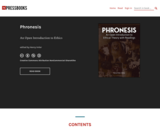
An Open Introduction to Ethics
Word Count: 173025
(Note: This resource's metadata has been created automatically by reformatting and/or combining the information that the author initially provided as part of a bulk import process.)
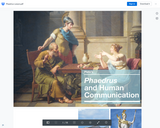
This lesson provides some background on Plato's text, Phaedrus, situating it within the history of rhetoric and communication and the arguments between Plato/Socrates and the Sophists. It includes links to several versions of Phaedrus (including free audio versions) and features a rap battle assignment.
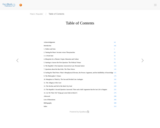
This book is a lucid and accessible companion to Plato’s Republic, throwing light upon the text’s arguments and main themes, placing them in the wider context of the text’s structure. In its illumination of the philosophical ideas underpinning the work, it provides readers with an understanding and appreciation of the complexity and literary artistry of Plato’s Republic. McAleer not only unpacks the key overarching questions of the text – What is justice? And Is a just life happier than an unjust life? – but also highlights some fascinating, overlooked passages which contribute to our understanding of Plato’s philosophical thought.
Plato’s 'Republic': An Introduction offers a rigorous and thought-provoking analysis of the text, helping readers navigate one of the world’s most influential works of philosophy and political theory. With its approachable tone and clear presentation, it constitutes a welcome contribution to the field, and will be an indispensable resource for philosophy students and teachers, as well as general readers new to, or returning to, the text.
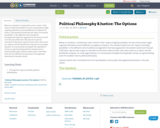
Below is a handout I created that covers *some* of the "space of logical possibility" for how communities might organize themselves around different conceptions of justice. This handout draws from the "space of actuality possibility" or the different sorts of political arrangements that have appeared in the western world over the past 2,500 years. My aim was to give an overview via the three criteria of who rules, who counts as a citizen, and the distribution of goods. As a two page handout, it is necessarily incomplete but hopefully it serves as a good starting point for students new to political philosophy.
I placed a photo that I took below from the new Modesto mural project that appeared downtown in the past month.
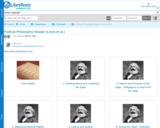
In terms of a political entity, a state is any politically organized community living under a single system
of government. States may or may not be sovereign. For instance, federated states are members of a
federal union, and may have only partial sovereignty, but are, nonetheless, states. Some states are
subject to external sovereignty or hegemony, in which ultimate sovereignty lies in another state. States
that are sovereign are known as sovereign states.
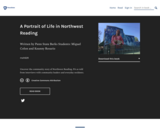
Written by Penn State Berks Students: Miguel Colon and Keanny Rosario
Short Description:
Uncover the community story of Northwest Reading, PA as told from interviews with community leaders and everyday residents.
Word Count: 9164
(Note: This resource's metadata has been created automatically by reformatting and/or combining the information that the author initially provided as part of a bulk import process.)
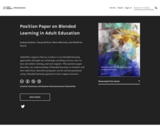
Short Description:
This is an archive. The updated, current version of this resource is here: https://sites.google.com/alphaplus.ca/digital-skills-assessment/home
Long Description:
AlphaPlus supports literacy workers to use blended learning approaches through our technology coaching services, face-to-face and online training, and tech support. This position paper describes our understanding of blended learning, its benefits and how adult basic education programs can be (re)conceptualized using a blended learning approach to best support learners.
Word Count: 4420
(Note: This resource's metadata has been created automatically by reformatting and/or combining the information that the author initially provided as part of a bulk import process.)

This course covers topics and questions such as: What is poverty? How is it defined and measured in the United States and other countries? What are the different program designs that countries use to relieve poverty? To answer these questions, the course examines the main public policy frames that guide theory, research, policy, and practice. How do the definition and policies to deal with poverty change over time? What are the economic, political, and social forces that contribute to the persistence of poverty and its periodic reframing? Can social science to help to resolve the public policy debates that make poverty and its relief so controversial?

Using examples from anthropology and sociology alongside classical and contemporary social theory, this course explores the nature of dominant and subordinate relationships, types of legitimate authority, and practices of resistance. The course also examines how we are influenced in subtle ways by the people around us, who makes controlling decisions in the family, how people get ahead at work, and whether democracies, in fact, reflect the "will of the people."
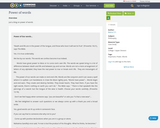
Just a blog on power of words
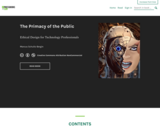
The Primacy of the Public presents a framework for engineering and technology ethics focused around three core ethical principles: the principle of welfare, the autonomy principle, and the fairness principle. To support this framework, the book begins with an examination of multiple perspectives we may take on engineering and technology, all of which support the centrality of ethical analysis and evaluation. These include the nature of engineering as a profession, the social context of engineering and technology, and the view that many technologies constitute social experiments.
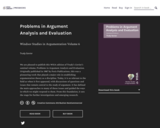
Windsor Studies in Argumentation Volume 6
Short Description:
We are pleased to publish this WSIA edition of Trudy’s Govier’s seminal volume, Problems in Argument Analysis and Evaluation. Originally published in 1987 by Foris Publications, this was a pioneering work that played a major role in establishing argumentation theory as a discipline. Today, it is as relevant to the field as when it first appeared, with discussions of questions and issues that remain central to the study of argument. It has defined the main approaches to many of those issues and guided the ways in which we might respond to them. From this foundation, it sets the stage for further investigations and emerging research.
Long Description:
We are pleased to publish this WSIA edition of Trudy’s Govier’s seminal volume, Problems in Argument Analysis and Evaluation. Originally published in 1987 by Foris Publications, this was a pioneering work that played a major role in establishing argumentation theory as a discipline. Today, it is as relevant to the field as when it first appeared, with discussions of questions and issues that remain central to the study of argument. It has defined the main approaches to many of those issues and guided the ways in which we might respond to them. From this foundation, it sets the stage for further investigations and emerging research.
This is a second edition of the book that is corrected and updated by the author, with new prefaces to each chapter.
Word Count: 140275
(Note: This resource's metadata has been created automatically by reformatting and/or combining the information that the author initially provided as part of a bulk import process.)

This course is an introduction to the problems of philosophy—in particular, to problems in ethics, metaphysics, theory of knowledge, and philosophy of logic, language, and science. It takes a systematic rather than historical approach. Readings come from classical and contemporary sources, but emphasis is on examination and evaluation of proposed solutions to the problems.
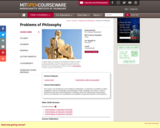
This course is an introduction to the problems of philosophy—in particular, to problems in ethics, metaphysics, theory of knowledge, and philosophy of logic, language, and science. It takes a systematic rather than historical approach. Readings come from classical and contemporary sources, but emphasis is on examination and evaluation of proposed solutions to the problems.

Explore where the prohibitions and permissions that occur in every day life come from, why they exist, and what gives them force. For example: food—you are only willing and able to eat a subset of the world's edible substances. Marriage—some marriages are prohibited by law or by custom. This course addresses questions of prohibition and permission using psychological sources and literary works from ancient to modern. Texts include works by Shakespeare, Melville, Mary Rowlandson, and Anita Desai. Students give group and individual oral presentations.

Short Description:
Bringing together aspects of ethics, social and civil responsibility, advocacy and publics, this introductory textbook provides a new approach to communication theory and practice in the post truth era. In this book, students will examine fields that intersect with public interest frameworks to provide building blocks and strategies for effective communication. These include organisational listening, capacity building, partnerships and alliances, the role of social enterprises, the concepts of 'wicked problems' and 'discourse arenas', and the importance of participation and activism in generating democratic debate. The book examines social problems and interest conflicts that are faced every day - from environmental degradation to homelessness; public health to media power - and considers the positions of different publics and individuals in navigating the communication of public interest processes and outcomes.
Long Description:
‘What an amazing resource for students. The mixture of accessible and informative text, case studies, interactive activities, and more make this such an engaging read.’ Professor Kelly Fielding, University of Queensland
‘This book is an excellent resource for students, practitioners, and community organisations among others, which provides a comprehensive overview and deeper insights situating public interest communication in society.’ Assistant Professor Michele Clark, Bond University
‘Students will find Johnston and Gulliver’s book an excellent introduction to the theoretical debates around the concept of the ‘public interest’, an idea which is of central importance in ethics, democratic government, the law, and the notion of a ‘free press’.’ Dr Ian Somerville, University of Leicester
‘This is a fabulous introduction to key concepts in public interest communication. It untangles the notion of ‘publics’ and shows how theories of the public interest, the public sphere, and discourse arenas, among others, intersect with communication practice.’ Dr Skye Doherty, University of Queensland
‘This book shines a spotlight on the strategic value and purpose of communication by showing its centrality to finding solutions. While addressing action as well as theory, it goes beyond the usual tactical-level discussion to focus on the context in which communication contributes to society.’ Dr Leanne Glenny, University of South Australia
Word Count: 22869
ISBN: 978-1-74272-359-4
(Note: This resource's metadata has been created automatically by reformatting and/or combining the information that the author initially provided as part of a bulk import process.)
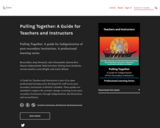
Pulling Together: A guide for Indigenization of post-secondary institutions. A professional learning series.
Short Description:
A Guide for Teachers and Instructors is part of an open professional learning series developed for staff across post-secondary institutions in British Columbia. These guides are intended to support the systemic change occurring across post-secondary institutions through Indigenization, decolonization, and reconciliation.
Long Description:
A Guide for Teachers and Instructors is part of an open professional learning series developed for staff across post-secondary institutions in British Columbia. These guides are intended to support the systemic change occurring across post-secondary institutions through Indigenization, decolonization, and reconciliation.
Word Count: 13904
ISBN: 978-1-77420-048-3
(Note: This resource's metadata has been created automatically by reformatting and/or combining the information that the author initially provided as part of a bulk import process.)

Pulling Together: A guide for Indigenization of post-secondary institutions. A professional learning series.
Short Description:
A Guide for Teachers and Instructors is part of an open professional learning series developed for staff across post-secondary institutions in British Columbia. These guides are intended to support the systemic change occurring across post-secondary institutions through Indigenization, decolonization, and reconciliation.
Long Description:
A Guide for Teachers and Instructors is part of an open professional learning series developed for staff across post-secondary institutions in British Columbia. These guides are intended to support the systemic change occurring across post-secondary institutions through Indigenization, decolonization, and reconciliation.
Word Count: 13882
(Note: This resource's metadata has been created automatically by reformatting and/or combining the information that the author initially provided as part of a bulk import process.)

Word Count: 55735
ISBN: 978-1-945764-22-6
(Note: This resource's metadata has been created automatically by reformatting and/or combining the information that the author initially provided as part of a bulk import process.)
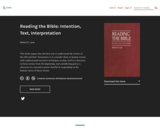
Short Description:
This book argues that the best way to understand the stories of the Old and New Testaments is to consider them as human stories with sophisticated narrative techniques at play. God is a character in these stories from the beginning, and considering god as a character in a narrative proves fruitful in responding to the human voices of these stories.
Long Description:
This book argues that the best way to understand the stories of the Old and New Testaments is to consider them as human stories with sophisticated narrative techniques at play. God is a character in these stories from the beginning, and considering god as a character in a narrative proves fruitful in responding to the human voices of these stories.
Although many readers go to the Bible to find the revealed word of Yahweh or of the Christian God, what they find there is always an interpretation of the text through the filters of a religious dogma which exists prior to the reading of the text. Reading the Bible suggests another way of reading the texts, a way of reading which concentrates not on “what does it mean?” but on “what does it say?” and “what do I see there?” The result is a fresh approach to the reading of these biblical texts, an approach which celebrates human storytelling while investigating myth, language, and the act of reading a text.
– from the book cover
Word Count: 78055
ISBN: 0-595-31874-6
(Note: This resource's metadata has been created automatically by reformatting and/or combining the information that the author initially provided as part of a bulk import process.)
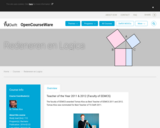
Het vak Redeneren en Logica gaat over redeneringen en hun geldigheid. Een redenering bestaat uit een aantal premissen, en een conclusie. Een redenering is geldig wanneer de conclusie altijd waar is wanneer de premissen dat zijn. Het kan, wanneer een redenering geldig is, dus niet voorkomen dat de premissen waar zijn, en de conclusie onwaar. Zo'n situatie heet een tegenvoorbeeld, en dat toont aan dat een redenering ongeldig is. Wanneer een redenering geldig is, heet hij een stelling ("theorem" in het engels), en kan men de conclusie afleiden uit de aannanme dat de premissen waar zijn. Zo'n afleiding heet een bewijs.

This course provides an introduction to major political, social, cultural and intellectual changes in Europe from the beginnings of the Renaissance in Italy around 1300 to the outbreak of the French Revolution at the end of the 1700s. It focuses on the porous boundaries between categories of theology, magic and science, as well as print. It examines how developments in these areas altered European political institutions, social structures, and cultural practices. It also studies men and women, nobles and commoners, as well as Europeans and some non-Europeans with whom they came into contact.

Short Description:
Republic (circa 375 BC) is a Socratic dialogue by Plato. The text explores topics like justice, the order and character of the just city-state, and the just man. It is one of the most influential works of philosophy and political theory—both intellectually and historically—in the world, thus marking it as Plato's best-known work.
Long Description:
Republic (circa 375 BC) is a Socratic dialogue by Plato. The text explores topics like justice, the order and character of the just city-state, and the just man. It is one of the most influential works of philosophy and political theory—both intellectually and historically—in the world, thus marking it as Plato’s best-known work.
Word Count: 217042
Included H5P activities: 1
(Note: This resource's metadata has been created automatically by reformatting and/or combining the information that the author initially provided as part of a bulk import process.)
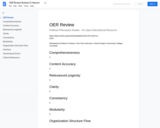
Review of Political Philosophy Reader : An Open Educational Resource: https://drive.google.com/open?id=1DERWm3kL46bnuDE3Ed-DpzoyUbr7gxIsMyFRvKoE1aI

This course uses the study of rhetoric as an opportunity to offer instruction in critical thinking. Through extensive writing and speaking assignments, students will develop their abilities to analyze texts of all kinds and to generate original and incisive ideas of their own. Critical thinking and original analysis as expressed in writing and in speech are the paramount goals of this class. The course will thus divide its efforts between an examination of the subject matter and an examination of student writing and speaking, in order to encourage in both instances the principal aims of the course.

This course uses readings and discussions to focus on a series of short-term events that shed light on American politics, culture, and social organization. It emphasizes finding ways to make sense of these complicated, highly traumatic events, and on using them to understand larger processes of change in American history. The class also gives students experience with primary documentation research through a term paper assignment.
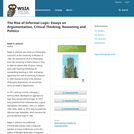
We are pleased to release this digital edition of Ralph Johnson’s The Rise of Informal Logic as Volume 2 in the series Windsor Studies in Argumentation. This edition is a reprint of the previous Vale Press edition with some minor corrections.
We have decided to make this the second volume in the series because it is such a compelling account of the formation of informal logic as a discipline, written by one of the founders of the field. The book includes essential chapters on the history and development of informal logic. Other chapters are key reflections on the theoretical issues raised by the attempt to understand informal argument. Many of the papers were previously published in important journals. A number of them were co-authored with J. Anthony Blair. Three of them have appeared only in the present book.
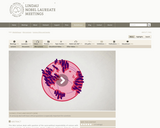
This Mini Lecture deals with question of the socio-political responsibility of science with lecture snippets of Nobel Laureates Roald Hoffmann, Dickinson Richards, Werner Forssmann, and Christian de Duve.
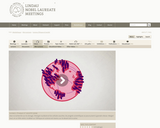
Avec la recherche sur le clonage, l’énergie nucléaire et les cellules souches, les progrès scientifiques se poursuivent à grande vitesse. Malgré tout, en ce XXIe siècle, le débat sur l’éthique en science est revenu sur le devant de la scène.

This Open Educational Resource will allow students to learn more about who Sally Haslanger is and her contributions to the world of Philosophy. Additionally, students will be able to engage with discussion questions that will allow them to reflect on Gender and Race and how these social contructions affect them in their every day lives.

open readings in philosophy
Word Count: 306460
(Note: This resource's metadata has been created automatically by reformatting and/or combining the information that the author initially provided as part of a bulk import process.)
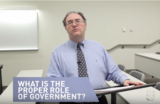
What is "classical liberalism?" Is it a specific set of beliefs, a philosophy, an economic theory, or something else? In this video mini-course, Dr. Nigel Ashford of the Institute for Humane Studies explores what classical liberalism -- sometimes referred to as "libertarianism" -- actually means. Dr. Ashford looks at 5 different schools of classical liberalism, and examines their similarities and differences.

A Canadian perspective
Word Count: 364274
(Note: This resource's metadata has been created automatically by reformatting and/or combining the information that the author initially provided as part of a bulk import process.)

This advanced course in anthropology engages closely with discussions and debates about ethnographic research, ethics, and representation.
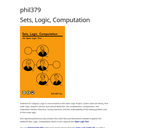
Textbook for Calgary's Logic II course based on the Open Logic Project. Covers naive set theory, first-order logic, sequent calculus and natural deduction, the completeness, compactness, and Löwenheim-Skolem theorems, Turing machines, and the undecidability of the halting problem and of first-order logic.
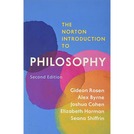
Short summary of Appearance and Reality chapter from "The Norton Introduction to Philosophy" and sticky notes to better understand the chapter.
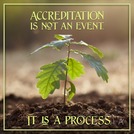
Social Emotional Learning is considered the most important topic in Education.
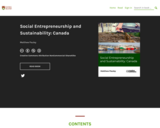
Word Count: 166708
ISBN: 978-1-988692-59-3
(Note: This resource's metadata has been created automatically by reformatting and/or combining the information that the author initially provided as part of a bulk import process.)

This course seeks to provide students with a general understanding of the form of collective action known as the social movement. Our task will be guided by the close examination of several twentieth century social movements in the United States. We will read about the U.S. civil rights, the unemployed workers', welfare rights, pro-choice / pro-life and gay rights movements. We will compare and contrast certain of these movements with their counterparts in other countries. For all, we will identify the reasons for their successes and failures.
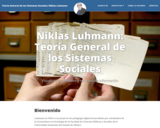
Social Systems Theory: Niklas Luhmann is a project developed by sociology students at the Universidad Autónoma del Estado de México. The aim of the project is to collect quality information available on the Internet about the theoretical proposal of Niklas Luhmann, a German sociologist with a great influence on the discipline. This work is part of the course Complexity and Systems Theory, taught at the Faculty of Political and Social Sciences.
---------------------
Teoría General de los Sistemas Sociales: Niklas Luhmann es un proyecto desarrollado por estudiantes de sociología de la Universidad Autónoma del Estado de México. El objetivo del proyecto es recopilar información de calidad disponible en Internet acerca de la propuesta teórica de Niklas Luhmann, sociólogo alemán con una gran influencia en la disciplina. Este trabajo forma parte del curso Complejidad y Teoría de Sistemas, impartido en la Facultad de Ciencias Políticas y Sociales
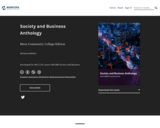
Mesa Community College Edition
Short Description:
Developed for MCCCD course SBU200 Society and Business
Word Count: 110867
(Note: This resource's metadata has been created automatically by reformatting and/or combining the information that the author initially provided as part of a bulk import process.)
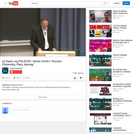
Lecture on Plato's Apology.
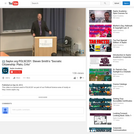
Lecture on Plato's Crito.

Medicine Hat Edition
Short Description:
Some Problems of Philosophy is a first pass at providing a beginning text for college and university students.
Long Description:
Some Problems of Philosophy is designed to be used with a first year course in philosophy that covers a little informal logic, God, knowledge, and mind. It includes some first rate original contributions from contemporary thinkers and the obvious historical works.
Word Count: 88250
ISBN: 978-1-55195-465-3
(Note: This resource's metadata has been created automatically by reformatting and/or combining the information that the author initially provided as part of a bulk import process.)
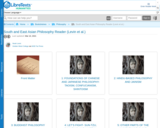
It is Euro-centric to refer to all the Philosophies of Asia as “Eastern” as it unfairly groups the quite various Philosophies that developed in West Asia (Zoroastrianism), South Asia (Buddhism, Jainism, Hinduism, Sikhism), and East Asia (Ch’an Buddhism, Taoism, Confucianism, Shintoism) into a single unit that implies they are quite similar. Other than their relative geographic proximity, the various philosophies are, in many ways, more different than those philosophies that have been developed in Europe and the other parts of the world. This first Unit explores some of the older philosophical
viewpoints that underlie much of the philosophy that has been developed in East Asia, particularly China and Japan. These are Taoism, Confucianism, and the philosophical underpinnings of the Shinto religions.
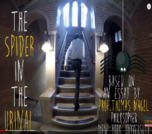
This thought experiment, based on an essay by Professor Thomas Nagel, Philosopher at New York University, encourages students to question the morality of intervention. Professor Nagel attempted to liberate a spider he found living in a urinal from it is seemingly terrible living situation, only to find it dead the next day. Wracked with guilt, he began to question his decision. Should he have moved the spider? What would you have done?

Unlike film, theater in America does not have a ratings board that censors content. So plays have had more freedom to explore and to transgress normative culture. Yet censorship of the theater has been part of American culture from the beginning, and continues today. How and why does this happen, and who decides whether a play is too dangerous to see or to teach? Are plays dangerous? Sinful? Even demonic? In our seminar, we will study plays that have been censored, either legally or extra-legally (i.e. refused production, closed down during production, denied funding, or taken off school reading lists). We'll look at laws, both national and local, relating to the "obscene", as well as unofficial practices, and think about the way censorship operates in American life now. And of course we will study the offending texts, themselves, to find what is really dangerous about them, for ourselves.

This course explores variations on the proposition that an adequate recognition of beauty could, however indirectly, make you a more humane person. Readings extend widely across literary and non-literary genres, including lyric poetry and the novel, philosophical prose and essays.
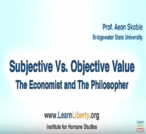
According to Professor Aeon Skoble of Bridgewater State University, the word “value” has very different meanings for economists and philosophers. Economists view value as subjective to reflect individual tastes and preferences. Philosophers, on the other hand, use the term objectively, to refer to concepts such as rights. In this video, Professor Skoble explains how these different conceptions actually compliment each other.
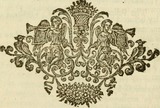
This is a sample syllabus for a moral reasoning course that will explore the historical life of Jesus of Nazareth, analyzing his role, influence, and teachings. We will look at examples of his impact on the lives of other famous historical figures and consider how his moral philosophy can apply to our contemporary life.The course is designed for students of all traditions, backgrounds, and lifestyles. All faith views will be invited and encouraged to share in civil interfaith dialogue.
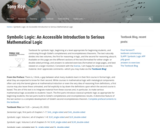
Textbook for symbolic logic, beginning at a level appropriate for beginning students, continuing through Gödel's completeness and incompleteness theorems. The text naturally divides into two volumes, the first for reasoning in logic, the second for reasoning about it.
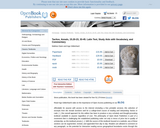
The emperor Nero is etched into the Western imagination as one of ancient Rome’s most infamous villains, and Tacitus’ Annals have played a central role in shaping the mainstream historiographical understanding of this flamboyant autocrat.
This section of the text plunges us straight into the moral cesspool that Rome had apparently become in the later years of Nero’s reign, chronicling the emperor’s fledgling stage career including his plans for a grand tour of Greece; his participation in a city-wide orgy climaxing in his publicly consummated ‘marriage’ to his toy boy Pythagoras; the great fire of AD 64, during which large parts of central Rome went up in flames; and the rising of Nero’s ‘grotesque’ new palace, the so-called ‘Golden House’, from the ashes of the city. This building project stoked the rumours that the emperor himself was behind the conflagration, and Tacitus goes on to present us with Nero’s gruesome efforts to quell these mutterings by scapegoating and executing members of an unpopular new cult then starting to spread through the Roman empire: Christianity.
All this contrasts starkly with four chapters focusing on one of Nero’s most principled opponents, the Stoic senator Thrasea Paetus, an audacious figure of moral fibre, who courageously refuses to bend to the forces of imperial corruption and hypocrisy.
This course book offers a portion of the original Latin text, study aids with vocabulary, and a commentary. Designed to stretch and stimulate readers, Owen’s and Gildenhard’s incisive commentary will be of particular interest to students of Latin at both A2 and undergraduate level. It extends beyond detailed linguistic analysis and historical background to encourage critical engagement with Tacitus’ prose and discussion of the most recent scholarly thought.
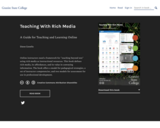
A Guide for Teaching and Learning Online
Short Description:
Online instructors need a framework for "teaching beyond text" using rich media as instructional resources. This book defines rich media, its affordances, and its value in conveying information. The book offers a model for pedagogical strategies, a set of instructor competencies, and two models for assessment for use in professional development.
Long Description:
Online instructors need a framework for “teaching beyond text” using rich media as instructional resources. These include multimedia, social media, and cloud-based Web tools. This book defines rich media, its affordances, its value in conveying information, a model for pedagogical strategies, a set of instructor competencies, and two models for assessment for use in professional development.
Word Count: 15257
(Note: This resource's metadata has been created automatically by reformatting and/or combining the information that the author initially provided as part of a bulk import process.)

Short Description:
This book offers an open guide to online discussions, media arts production, blended learning, and active learning from L&S Learning Support Services @ UW-Madison.
Long Description:
This book offers an open guide to online discussions, media arts production, blended learning, and active learning from L&S Learning Support Services @ UW-Madison. It was first published in 2015 to accompany an online professional development course provided by LSS.
Word Count: 35588
(Note: This resource's metadata has been created automatically by reformatting and/or combining the information that the author initially provided as part of a bulk import process.)
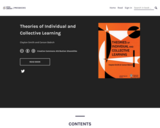
Word Count: 29007
(Note: This resource's metadata has been created automatically by reformatting and/or combining the information that the author initially provided as part of a bulk import process.)

This course is an introduction to epistemology: the theory of knowledge. We will focus on skepticism—that is, the thesis that we know nothing at all—and we will survey a range of skeptical arguments and responses to skepticism.

Why Most Abortions Aren’t Wrong & Why All Abortions Should Be Legal
Short Description:
To many people, abortion is an issue for which discussions and debates are frustrating and fruitless: it seems like no progress will ever be made towards any understanding, much less resolution or even compromise. When emotions run high, we sometimes need to step back and use a passion for calm, cool, critical thinking. This helps us better understand the positions and arguments of people who see things differently from us, as well as our own positions and arguments. Here we use basic critical thinking skills to argue that abortion is typically not morally wrong.
Long Description:
To many people, abortion is an issue for which discussions and debates are frustrating and fruitless: it seems like no progress will ever be made towards any understanding, much less resolution or even compromise. Judgments like these, however, are premature because some basic techniques from critical thinking, such as carefully defining words and testing definitions, stating the full structure of arguments so each step of the reasoning can be examined, and comparing the strengths and weaknesses of different explanations can help us make progress towards these goals. When emotions run high, we sometimes need to step back and use a passion for calm, cool, critical thinking. This helps us better understand the positions and arguments of people who see things differently from us, as well as our own positions and arguments. And we can use critical thinking skills help to try to figure out which positions are best, in terms of being supported by good arguments: after all, we might have much to learn from other people, sometimes that our own views should change, for the better. Here we use basic critical thinking skills to argue that abortion is typically not morally wrong. We begin with less morally-controversial claims: adults, children and babies are wrong to kill and wrong to kill, fundamentally, because they, we, are conscious, aware and have feelings. We argue that since early fetuses entirely lack these characteristics, they are not inherently wrong to kill and so most abortions are not morally wrong, since most abortions are done early in pregnancy, before consciousness and feeling develop in the fetus. Furthermore, since the right to life is not the right to someone else’s body, fetuses might not have the right to the pregnant woman’s body—which she has the right to—and so she has the right to not allow the fetus use of her body. This further justifies abortion, at least until technology allows for the removal of fetuses to other wombs. Since morally permissible actions should be legal, abortions should be legal: it is an injustice to criminalize actions that are not wrong. In the course of arguing for these claims, we: discuss how to best define abortion; dismiss many common “question-begging” arguments that merely assume their conclusions, instead of giving genuine reasons for them; refute some often-heard “everyday arguments” about abortion, on all sides; explain why the most influential philosophical arguments against abortion are unsuccessful; provide some positive arguments that at least early abortions are not wrong; briefly discuss the ethics and legality of later abortions, and more. This essay is not a “how to win an argument” piece or a tract or any kind of apologetics. It is not designed to help anyone “win” debates: everybody “wins” on this issue when we calmly and respectfully engage arguments with care, charity, honesty and humility. This book is merely a reasoned, systematic introduction to the issues that we hope models these skills and virtues. Its discussion should not be taken as absolute “proof” of anything: much more needs to be understood and carefully discussed—always.
Word Count: 16411
(Note: This resource's metadata has been created automatically by reformatting and/or combining the information that the author initially provided as part of a bulk import process.)

Negotiating School
Short Description:
Matters of social justice appear in various provincial curricula, but are often taught in isolation from a pedagogical discourse around issues of diversity.
Long Description:
Conversations about oppression, marginalization, at-risk children, and the specific manifestations of these issues are neither novel nor unfamiliar in educational circles. Well-intentioned educators have grappled with how to address these topics for years. As university educators who teach within a social justice framework, we acknowledge these lived realities and the everyday effects they have on individuals. We also believe that there is a parallel perspective to this which is equally important: a strenuous and deliberate examination of one’s own privileges. This book examines some key critical moments in schooling processes and practices and the impacts that these decisions and policies have on the lives of students and teachers.
Word Count: 11068
ISBN: 978-1-7781696-9-4
(Note: This resource's metadata has been created automatically by reformatting and/or combining the information that the author initially provided as part of a bulk import process.)

Word Count: 114771
(Note: This resource's metadata has been created automatically by reformatting and/or combining the information that the author initially provided as part of a bulk import process.)
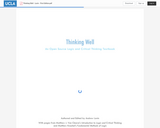
An Open Source Logic and Critical Thinking Textbook

This resource is a set of opening qeustions to encourage participants to reflect on the nature of community, especially during times where our normal lives, families, relationships have been disrupted. Phil

Courses in the Topics in Social Theory and Practice series feature in-depth considerations of such topics with reflections on their implications for social change.
The topic for Fall 2014 is race and racism. We will consider a variety of arguments for and against the biological and / or social "reality" of race—taking into account purported races other than those defined by the black / white binary and the intersection of race with other social categories. We will then consider a number of accounts of racism, contemporary manifestations of racism, and potential counter-measures.

Lectures on Global Hermeneutics
Short Description:
Why do human beings interpret their overall experience in terms of selfhood? How was the notion and sense of self shaped at different times and in different cultures? What sort of problems or paradoxes did these constructions face? These lectures address these and related questions by sketching a roadmap of possible theoretical avenues for conceiving of the self, bringing to the foreground its soteriological implications, while also testing this theoretical outlook against insights offered by various disciplines. Exploring the cross-cultural spectrum of possible ways of conceiving of the self invites the more existential question of whether any of these possibilities might offer resources for dealing with the tragedies of today’s world, or maybe even saving it from some of them.
Long Description:
Why do human beings interpret their overall experience in terms of selfhood? How was the notion and sense of self shaped at different times and in different cultures? What sort of problems or paradoxes did these constructions face? These lectures address these and related questions by sketching a roadmap of possible theoretical avenues for conceiving of the self, bringing to the foreground its soteriological implications, while also testing this theoretical outlook against insights offered by various disciplines (including philosophy, cognitive science, anthropology, archaeology, psychology, religious studies, intellectual history, and contemplative practices) and in specific historical cultures (ancient India and Greece, the modern West). The resulting journey is a way of practicing hermeneutics, the art of understanding and interpreting experience in its multifarious manifestations (which include different genres of written texts, oral traditions, social structures and practices, various sorts and domains of experience, ideas and ideals). This form of hermeneutics is best understood as ‘global hermeneutic’ both because of its temporal and geographical scope, and because of its interest on a phenomenon so broad and deeply rooted as selfhood. The purpose of the journey is not only descriptive, though. Exploring the cross-cultural spectrum of possible ways of conceiving of the self invites the more existential question of whether any of these possibilities might offer resources for dealing with the tragedies of today’s world, or maybe even saving it from some of them. An open access pdf and printed version is published via the University of Groningen Press.
Word Count: 204910
Included H5P activities: 2
ISBN: 9789403430089
(Note: This resource's metadata has been created automatically by reformatting and/or combining the information that the author initially provided as part of a bulk import process.)
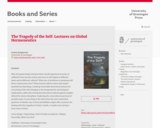
This book contains 14 lectures on the topic of Global Hermeneutics. It can be used in philosophy classes to discuss the concept of the self, as it showcases different theoretical avenues of how the self is conceived. The synopsis reads as follows:
Why do human beings interpret their overall experience in terms of selfhood? How was the notion and sense of self shaped at different times and in different cultures? What sort of problems or paradoxes did these constructions face? These lectures address these and related questions by sketching a roadmap of possible theoretical avenues for conceiving of the self, bringing to the foreground its soteriological implications, while also testing this theoretical outlook against insights offered by various disciplines. Exploring the crosscultural spectrum of possible ways of conceiving of the self invites the more existential question of whether any of these possibilities might offer resources for dealing with the tragedies of today’s world, or maybe even saving it from some of them.

Religions of the World in Philosophical Perspective
Short Description:
The book explores the world's major religions using a philosophical context that best represents the nature of the religion
Long Description:
TAKEN AS ORGANIZED ENTITIES, the world’s religions are an amazing lot, to say the least. Yet, books about religion often emphasize the factual and visual details, and narrative expression of a religion without necessarily providing a narrative philosophical framework for exploring the tradition. Transcendent Realities: Religions of the World in Philosophical Perspective attempts to provide just such a context for assessing a given religious tradition: a philosophical concept reflecting the religion as a cognitive or intellectual whole. As such, this book welcomes readers to explore religion from a more philosophically informed and enlightened perspective.
Although the book features twelve of the world’s foremost religions as its primary emphasis, it also provides a brief philosophical foundation for each religion as the primary basis for contextualizing the tradition. Consequently, the religions are explored with attention to a primary philosophical structure or context that attempts to capture the essence of, or, at least, the philosophical superstructure that perhaps guides the tradition. Relevant to the religions chosen for exploration, the book is organized according to a primarily geographical order, although its emphasis on an east to west approach as its geographic development may also suggest an historical or chronological progression. The book focuses first on representative Indigenous African and North American religions, then Far Eastern religions, Eastern Indian religions, and finally the Western religions. The book does not go into an exploration of new religions as these are typically in the pre-developmental stage relevant to their philosophical conceptualizations.
Among the key features of the book is use of visuals placed within the reading content in a way designed to enhance the more philosophically reflective inquiries the study of religion naturally inspires. Combining the visual with the literary is of itself a philosophical enterprise, and doing so when engaged with religious phenomena can make for a more uniquely interesting and engaging reading experience. The author’s primary intent with the visuals is to stimulate philosophical reflection during the reading experience, and yet without the visuals taking away from the reading content.
Finally, the book does not include assessment supplements such as a test bank, video, or companion website study materials. Instead, the requested approach to assessment stemming from the book for those using the book in an academic setting is to stimulate construction of uniquely applied testing or other materials that reflect the phenomenon of engagement with the book and its ideas and approaches to the content. Each instructor may choose to emphasize their own key points of interest, and for this reason the making of a one-type-fits-all approach to assessment materials seemed restrictive at best. Sixteenth-century French theologian John Calvin once stated that one’s “immediate intuition” with a text is the finest and most exemplary essence of its assessment; perhaps instructors should craft their own assessment materials based on student’s recent engagement with the materials.
This book has been a long time in the making, and reflects not only a variety of classroom experiences, but a lifetime of religious interest and involvement. In many respects, if it may be true that people are the sum total of their thoughts and experiences, as the Buddhist might say, this book reflects the sum total perspective on what I’ve discovered in attempting to understand my own religious views, traditions, and the views of others over the years.
The author wishes to thank the 4,000+ students who have taken my course in World Religions over the past 12 years, and especially to the University of West Florida for the grant necessary for the writing of this book. I’m also further indebted to Dr. Amy Cook and Dr. Erin Stone for their excellent current leadership of the Department of History & Philosophy at UWF, and to Dr. Sally Ferguson and Dr. Brian Hood for their past leadership when the department of Philosophy was a stand-alone entity.
In a world of radically increasing cultural complexity, and with this the difficulties involved when religion is introduced and engaged, it is my hope that this book can help contribute to a more truthful, peaceful, enlightened, and perhaps more accepting or empathetic world. If religion exists as the great ennobling force for an increasing civilized and refined humanity that many of its proponents espouse, then a keen exploration of the religions of the world is no doubt a necessary venture. This book will hopefully help to provide this adventure to those who seek it.
Word Count: 157836
(Note: This resource's metadata has been created automatically by reformatting and/or combining the information that the author initially provided as part of a bulk import process.)
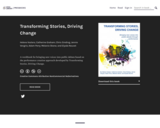
Short Description:
A workbook for bringing new voices into public debate based on the performance creation approach developed by Transforming Stories, Driving Change.
Long Description:
Can theatre bring new voices into public debate? Facilitating theatre workshops with community members who experience social marginalization is an art that, when done well, feels more like magic. But even the best facilitators are not magicians. With this workbook we pull back the curtain on the magic by taking readers behind the scenes of the Hamilton-based research and performance initiative Transforming Stories, Driving Change (TSDC.) Since 2015, TSDC teams have worked alongside community partners and performer-advocates to make plays designed to draw attention to the voices and visions of people whose opinions are not often represented in discussions of the future of the City. Through our performances, we have tried to contribute to building the movements that can make public leaders more accountable to people who are affected by their decisions. Five years and four plays later, we offer this workbook as a practical guide to TSDC’s creative approach.
Word Count: 51178
(Note: This resource's metadata has been created automatically by reformatting and/or combining the information that the author initially provided as part of a bulk import process.)
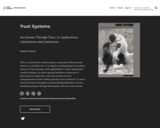
A Journey Through Trust, its Applications, Calculations and Limitations
Short Description:
This is a short book, written partly as a personal reflection and partly as a scientific text. It is aimed at undergraduate to graduate classes in Trust Systems, with applicability to other information security domains, as well as general audiences interested in knowing more about how trust and security work in computational systems without getting overly technical. It covers trust from basics through to introducing formalizations of trust, including journeys through blockchains and zero trust systems.
Word Count: 80673
ISBN: 978-1-7779195-0-4
(Note: This resource's metadata has been created automatically by reformatting and/or combining the information that the author initially provided as part of a bulk import process.)

Word Count: 139297
(Note: This resource's metadata has been created automatically by reformatting and/or combining the information that the author initially provided as part of a bulk import process.)

the Work of Critical Digital Pedagogy
Short Description:
This collection of essays explores the authors’ work in, inquiry into, and critique of online learning, educational technology, and the trends, techniques, hopes, fears, and possibilities of digital pedagogy.
Long Description:
Too many approaches to teaching with technology are instrumental at best, devoid of heart and soul at worst. The role of the teacher is made impersonal and mechanistic by a desire for learning to be efficient and standardized. Solutionist approaches like the learning management system, the rubric, quality assurance, all but remove the will of the teacher to be compassionate, curious, and to be a learner alongside their students.
As the authors write in their introduction: “It is urgent that we have teachers. In a political climate increasingly defined by obstinacy, lack of criticality, and deflection of fact and care; in a society still divided across lines of race, nationality, religion, gender, sexuality, income, ability, and privilege; in a digital culture shaped by algorithms that neither know nor accurately portray truth, teaching has an important (urgent) role to play.” This collection of essays explores the authors’ work in, inquiry into, and critique of online learning, educational technology, and the trends, techniques, hopes, fears, and possibilities of digital pedagogy. The ideas of this volume span almost two decades of pedagogical thinking, practice, outreach, community development, and activism.
Word Count: 80489
(Note: This resource's metadata has been created automatically by reformatting and/or combining the information that the author initially provided as part of a bulk import process.)

Video case studies in ethics and business ethics. Pace University & webpage link.

This course examines the problem of mass violence and oppression in the contemporary world, and the concept of human rights as a defense against such abuse. It explores questions of cultural relativism, race, gender and ethnicity. It examines case studies from war crimes tribunals, truth commissions, anti-terrorist policies and other judicial attempts to redress state-sponsored wrongs. It also considers whether the human rights framework effectively promotes the rule of law in modern societies. Students debate moral positions and address ideas of moral relativism.

Exploring Neuroscience and Neurotechnologies at Home
Word Count: 13512
(Note: This resource's metadata has been created automatically by reformatting and/or combining the information that the author initially provided as part of a bulk import process.)

Exploring Neuroscience and Neurotechnologies at Home
Word Count: 13450
(Note: This resource's metadata has been created automatically by reformatting and/or combining the information that the author initially provided as part of a bulk import process.)
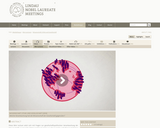
Diese Mini Lecture setzt sich mit Fragen zur gesellschaftspolitischen Verantwortung der Wissenschaft auseinander. Dabei werden Auszüge aus den in Lindau gehaltenen Vorträgen der Nobelpreisträger Roald Hoffmann, Dickinson Richards, Werner Forssmann, Christian de Duve gezeigt.

On this page you will find an Introduction to Philosophy (full text) and a critical thinking primer (36 pages), "How to be a Reasonable Person."
https://commons.bellevuecollege.edu/wrussellpayne/
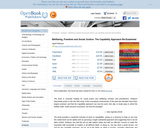
How do we evaluate ambiguous concepts such as wellbeing, freedom, and social justice? How do we develop policies that offer everyone the best chance to achieve what they want from life? The capability approach, a theoretical framework pioneered by the philosopher and economist Amartya Sen in the 1980s, has become an increasingly influential way to think about these issues.
Wellbeing, Freedom and Social Justice: The Capability Approach Re-Examined is both an introduction to the capability approach and a thorough evaluation of the challenges and disputes that have engrossed the scholars who have developed it. Ingrid Robeyns offers her own illuminating and rigorously interdisciplinary interpretation, arguing that by appreciating the distinction between the general capability approach and more specific capability theories or applications we can create a powerful and flexible tool for use in a variety of academic disciplines and fields of policymaking.
This book provides an original and comprehensive account that will appeal to scholars of the capability approach, new readers looking for an interdisciplinary introduction, and those interested in theories of justice, human rights, basic needs, and the human development approach.
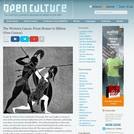
Taught by William Flesch at Brandeis University, this course offers a survey of some of the greatest and most influential works on Western literature, philosophy and culture, from Homer through Milton. Part of the through line is that every writer covered in the course wrote in a context inherited from the earlier ones, so we look at affiliations between them all. The course used the Lattimore translations of the Iliad and the Odyssey, and the Hollander translations of Dante. For the other works, any translation or edition is fine.
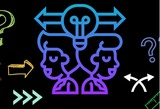
This OER is a collection of case studies for discussions on ethical decision-making. It uses Communitarian and other philosophies to determine how and if outcomes might have been different uses alternatives to Utilitarianism. Cases cover recent issues in public relations, journalism, video games, social media, influencers, advertising, artificial intelligence, reality TV, and luxury brands.
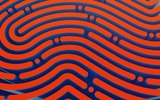
The purpose of this OER is to explore and define the concept of What is Personal Identity?, from Chapter 11 of Norton's Introductions to Philosophy, and Reasons and Persons by Derek Parfit. The OER was created by an undergraduate student from the University of Colorado at Colorado Springs and includes the breakdown of the material covered in the lesson. Discussion questions are provided to engage participants by contributing to the provided material covered. Following the discussion questions, an article covering the concept of cloning is provided to assist in the argument of Parfit's theory of personal identity and replication, along with a quiz.